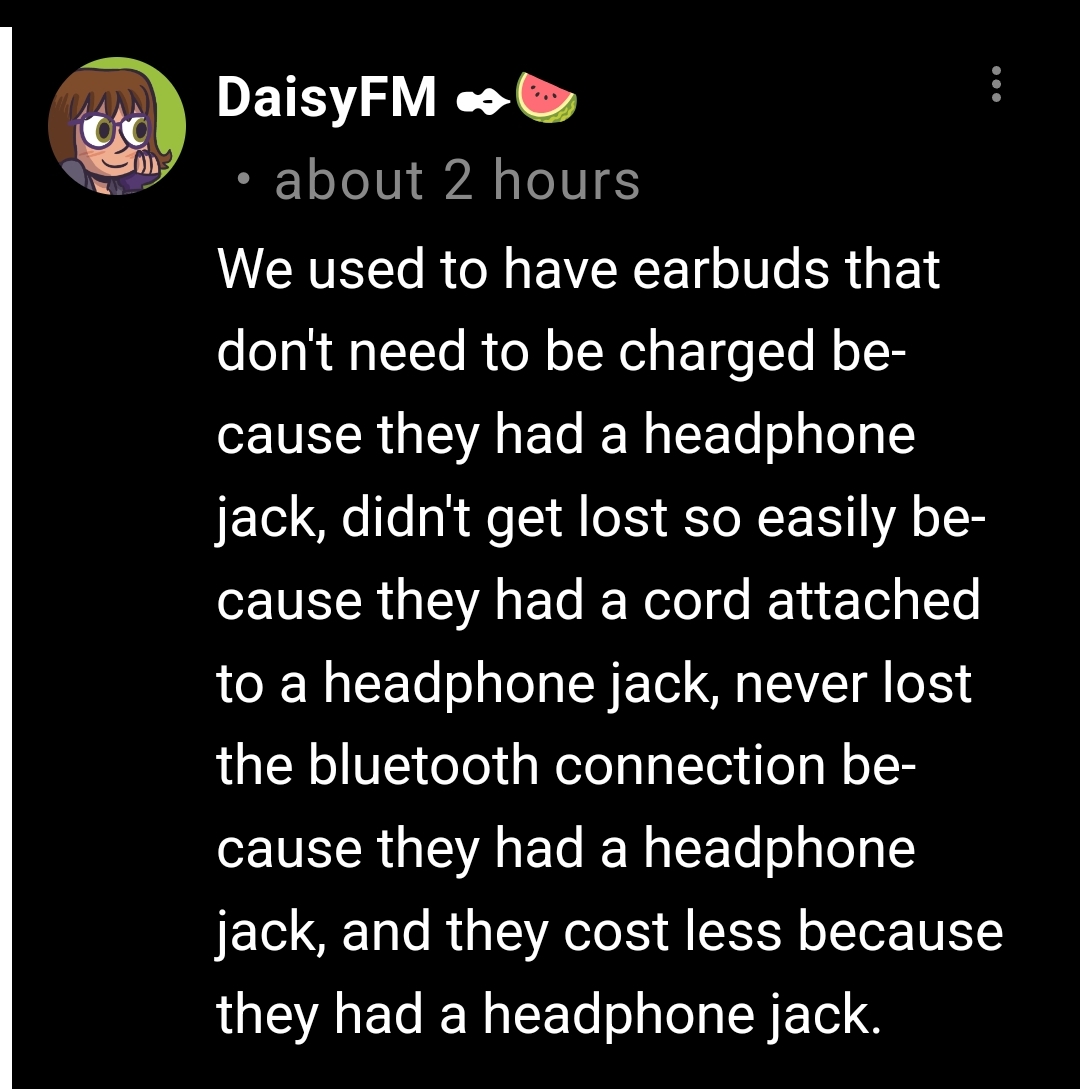this post was submitted on 08 Sep 2024
1651 points (95.4% liked)
Microblog Memes
8175 readers
1789 users here now
A place to share screenshots of Microblog posts, whether from Mastodon, tumblr, ~~Twitter~~ X, KBin, Threads or elsewhere.
Created as an evolution of White People Twitter and other tweet-capture subreddits.
Rules:
- Please put at least one word relevant to the post in the post title.
- Be nice.
- No advertising, brand promotion or guerilla marketing.
- Posters are encouraged to link to the toot or tweet etc in the description of posts.
Related communities:
founded 2 years ago
MODERATORS
you are viewing a single comment's thread
view the rest of the comments
view the rest of the comments

I'm confused how your pro #2 has to do with wireless headphones, as you could find much cheaper wired headphones with noise canceling even 20 years ago. I'm not sure about pass-through, but I imagine that's more of a feature now because of technology upgrades.
I even used those wired headphones while mowing the lawn with noise cancelling and could hear the music without having to crank the volume to max. I think there might have even been an EQ button with different settings pre-made (however weren't customizable to my knowledge). Not sure whether that's also just because of the technological process now or not.
I'd say battery life is another con for wireless headphones, both for the headphones themselves and the device being used. I have worked a job where we'd have some shifts as long as 10-12 hours and with wired headphones, I'd still have 20-30 percent of the phone battery left, even if I had been listening to YouTube videos with the brightness all the way down. However, with the wireless headphones either my headphones or my phone would die before the end of a long shift like that and I'd be stuck without my music for the last 2-3 hours, even just listening to music with no video.
My experience with earbuds (not headphones) that were "noise cancelling" before active noise cancelling was a thing was never all that great. The seal is too difficult to design in the same way over the ear headphones can be for passive noise cancelling. This is probably due to ear size differences and all that, so ymmv on whether or not passives work. Obviously, passive noise cancelling over-the-ears are going to be better, but that's basically always going to be true for any debate of Headphones vs Earbuds IMO.
I think there's a confusion caused by mixing up headphones and earbuds, which I think are for two very different markets. Earbuds have always been for the more casual audience.
My experience with battery life has been pretty much non-perceptual, but I did make note that I'm not sure how long the batteries in these devices can even really last. I agree that the disposable nature of battery-based headphones are a bit disconcerting.
Oh that's true, my headphones with noise canceling were also over-the-ear. I found that turning on the noise canceling worked great and brought down the sound of a lawnmower really well by playing sound waves opposite the waves of the motor to cancel each other out. I wasn't thinking about another pair of ear buds.
The wireless headphones that I was using went around your head and didn't pump the sound directly into your ear, but were supposed to use some bone conduction. I'm not sure if that's part of the battery issue that I saw. I just know that my phone itself would die before the end of my shift if I was using Bluetooth headphones (provided the headphones didn't die first) and I would still have battery left after using wired earbuds.